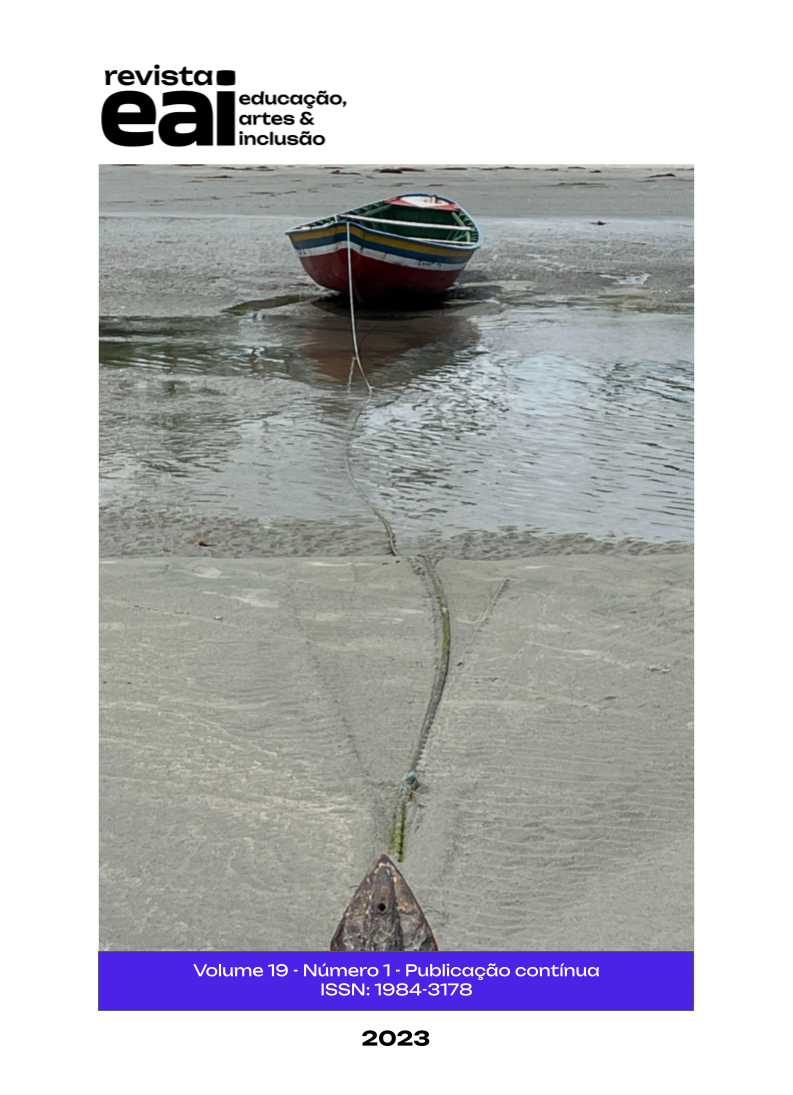The presence that happens by listening to one another
DOI:
https://doi.org/10.5965/198431781820231e0040Keywords:
visual impairment, inclusion, improvisation games, theatre at schoolAbstract
Discussing new possibilities of theatre and processes might be a way to figure out the possible understanding that such themes reach currently, considering new pedagogical processes when it comes to school issues. For that matter, we present a provocation to the concept that presence happens by listening to one another. As a reference point, we can mention the experience we had from our master’s degree, which involved Young people between 13 and 17 years old in a public school in the city of Natal, RN, Brazil by applying the method of pedagogical workshop and improvisation games. This has enabled us to move forward in experimenting a process that looks to broaden the concept of face-to-face theatre, by transposing the theatrical scene, having the sound as scenic unfolding. That way, a convergence game and the differences between presence (theatrical scene) and absence (sound scene) are established. The outcome has allowed us to assess the expansion of the scenic process happened by revealing new ways to understand himself and oneself, in addition to provoke the experience that by receiving something from the audible matrix might expand the comprehension of the scenic presence and, in the case of this study, of the very idea of inclusion.
Downloads
References
ALVES, Jefferson Fernandes. Audiodescrição e recepção teatral: um diálogo (im)pertinente entre o invisível e o visível da cena. In: DESGRANGES, Flávio.
SIMÕES, Giuliana (Orgs.). O Ato do Espectador: perspectivas artísticas e pedagógicas. São Paulo: Hucitec Editora, 2017. p. 181-195.
ARAÚJO, José Sávio. O papel da tecnologia cênica e seus desdobramentos para uma economia da produção cultural no Nordeste. Moringa. João Pessoa, Vol. 2, n. 1, 113-129, jan./jun. de 2011.
BACHELARD, Gaston. A poética do espaço. 2. ed. São Paulo: Martins Fontes, 2008. (Coleção Tópicos).
BAITELLO JUNIOR, Norval. A era da iconofagia: reflexões sobre a imagem, comunicação, mídia e cultura. São Paulo: Paulus, 2014.
BAKHTIN, Mikhail. Estética da criação verbal. 6. ed. São Paulo: Martins Fontes, 2017.
BUSATTO, Cléo. Práticas de oralidade na sala de aula. 1. ed. São Paulo: Cortez, 2010. (Coleção Oficinas aprender fazendo).
DESGRANGES, Flávio. A pedagogia do teatro: provocação e dialogismo. 3. ed. São Paulo: Hucitec, 2017.
DUBATTI, Jorge. Teatro, convívio e tecnovívio. In: CARREIRA, André Luiz Antunes Netto; BIÃO, Armindo Jorge De Carvalho; NETO, Walter Lima Torres (orgs.). Da cena contemporânea. Porto Alegre: VI Reunião Científica da ABRACE - Associação Brasileira de Pesquisa e Pós-Graduação em Artes Cênicas, 2011. p. 12-39.
GUMBRECHT, Hans Ulrich. Produção de Presença: o que o sentido não consegue transmitir. Rio de Janeiro: Contraponto, 2010.
JOBIM E SOUZA, Solange; ALBUQUERQUE, Elaine Deccache Porto e. A pesquisa em ciências humanas: uma leitura bakhtiniana. Revista Bakhtiniana, São Paulo, v. 7, p. 109- 122, Jul./Dez. 2012.
LÉVY, Pierre. Cibercultura. São Paulo: Editora 34, 1999.
PASSERINO, liliana Maria. A tecnologia assistiva na política pública brasileira e a formação de professores: que relação é essa? In: BAPTISTA, Claudio Roberto.(Org.). Escolarização e deficiência: configurações nas políticas de inclusão escolar. São Carlos/SP: Marquezine & Manzini; ABPEE, 2015, p. 189- 204
SCHAFER, R. Murray. O ouvido pensante. São Paulo: UNESP, 1991.
SPOLIN, Viola. Jogos teatrais na sala de aula: um manual para o professor. São Paulo: Perspectiva, 2007.
ZUMTHOR, Paul. Performance, recepção, leitura. 2. ed. São Paulo: Cosac Naify, 2007.
Downloads
Published
How to Cite
Issue
Section
License
Copyright (c) 2023 Thiago de Lima Torreão Cerejeira, Jefferson Fernandes Alves

This work is licensed under a Creative Commons Attribution-NonCommercial-ShareAlike 4.0 International License.
Copyright Statement
The Educação, Artes e Inclusão is a journal that follows the Free Access Policy. The articles published by the journal are free of charge, intended for educational and non-commercial applications. The articles whose authors are identified represent the expression from the point of view of their authors and not the official position of the Educação, Artes e Inclusão Journal or the Educação, Artes e Inclusão Research Group.
Authors who publish in this journal agree to the following terms:
(A) Authors retain the copyright and grant the journal the right of first publication, with the work simultaneously licensed under the Creative Commons Attribution License which allows the sharing of the work with acknowledgment of authorship and initial publication in this magazine.
(B) Authors are authorized to take additional contracts separately, for non-exclusive distribution of the version of the work published in this journal (eg publish in institutional repository or as a book chapter), with acknowledgment of authorship and initial publication in this magazine.
(C) This journal provides public access to all of its content, as this allows for greater visibility and scope of published articles and reviews. For more information on this approach, visit the Public Knowledge Project.
This journal is licensed under a Creative Commons Attribution-NonCommercial-ShareAlike 4.0 International License. This license allows others to remix, adapt and create from your work for non-commercial purposes, and although new work must give you due credit and cannot be used for business purposes, users do not have to license such derivative works under the same terms.



